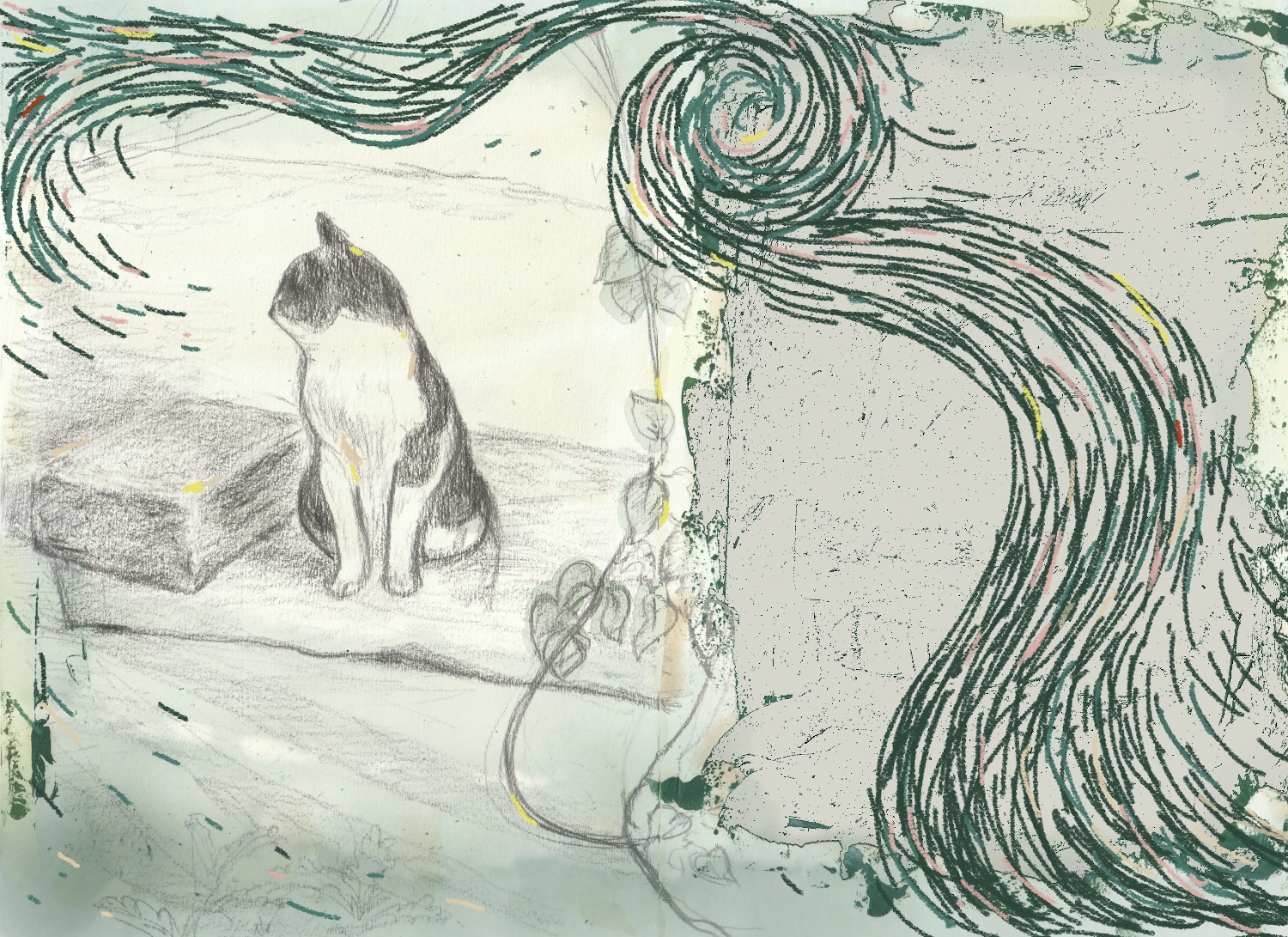
本期脚注·Footnotes
2 庄子《人间世》
【古文】匠石之齊,至乎曲轅,見櫟社樹。其大蔽數千牛,絜之百圍,其高臨山十仞而後有枝,其可以為舟者旁十數。觀者如市,匠伯不顧,遂行不輟。弟子厭觀之,走及匠石,曰:「自吾執斧斤以隨夫子,未嘗見材如此其美也。先生不肯視,行不輟,何邪?」曰:「已矣,勿言之矣!散木也。以為舟則沉,以為棺槨則速腐,以為器則速毀,以為門戶則液樠,以為柱則蠹。是不材之木也,無所可用,故能若是之壽。」匠石歸,櫟社見夢曰:「女將惡乎比予哉?若將比予於文木邪?夫柤梨橘柚果蓏之屬,實熟則剝,剝則辱。大枝折,小枝泄。此以其能苦其生者也。故不終其天年而中道夭,自掊擊於世俗者也。物莫不若是。且予求無所可用久矣,幾死,乃今得之,為予大用。使予也而有用,且得有此大也邪?且也若與予也皆物也,奈何哉其相物也!而幾死之散人,又惡知散木?」匠石覺而診其夢。弟子曰:「趣取無用,則為社何邪?」曰:「密!若無言!彼亦直寄焉,以為不知己者詬厲也。不為社者,且幾有翦乎?且也彼其所保與眾異,而以義譽之,不亦遠乎?」
【白话文】有一個名叫石的木匠,前往齊國,到了曲轅,看見一棵被奉為社神的櫟樹。這棵樹的樹蔭可以遮蔽幾千頭牛,量一量樹幹有數百尺粗。樹梢高達山頭,樹身數丈以上才分生枝幹。枝幹可以做成小船的就有十幾根。觀賞的人群擠得像市集一樣,木匠卻不瞧一眼,繼續往前走。弟子仔細把這棵樹看個夠,然後趕上木匠說:「自從我拿起斧頭,隨老師學藝以來,未曾見過木材有這麼好的。老師不肯看一眼,繼續往前走,為什麼呢?」木匠說:「算了,不要說它了!那是沒有用的散木。用它做船會沉,做棺材很快就會腐爛,做器具很快就會毀壞,做門窗會流出汁液,做樑柱會生蛀蟲。那是不成材的樹木,沒有一點用處,所以能夠這麼長壽。」木匠回家後,夜裡夢見櫟樹說:「你要拿我與什麼相比呢?你要拿我與有用的文木相比嗎?像山楂、梨、橘、柚之類的瓜果,果實熟了就會被摘下,摘下就會被扭折。大枝被折斷,小枝被拉走。這就是因為有才能而讓自已受苦,以致無法過完自然的壽命,在中途就夭折了,這是自已招引世俗的打擊。萬物無不如此。再說,我期許自己無用已經很久了,曾經幾乎被砍伐。現在我能保全自己,這就是我的大用。如果我是有用之材,能長得這麼大嗎?並且你與我都是萬物中的一物,何苦要互相對立競爭呢!你這個離死期不遠的散人,又怎麼知道散木是怎麼回事呢?」木匠醒來,把夢告訴弟子。弟子說:「它意在求得無用,為什麼還要做社樹呢?」木匠說:「安靜,別說了。它特別寄託於社神,就是要讓不瞭解它的人去批評。如果不做社神,難道要被砍伐嗎?如此,它用來自保的方法與眾不同,你只從外表來度量,不是離題太遠了嗎?」(傅佩榮《莊子內篇》第十四講_人間)
3 列维纳斯《时间与他者》
【中文版】日常生活和拯救... 我们在帕斯卡尔、克尔凯 郭尔、尼釆和海德格尔式的焦虑中,表现得就像丑陋的资产 阶级。要不然我们就是疯了。没有人会把疯癫当作一种拯救 的方案。小丑,莎士比亚悲剧中的疯子,就是那清晰地感受 到并说出世界的非一致性,以及诸情形之荒谬的人— 他不 是悲剧中的主要角色,也没有什么需要去战胜的。在一个满 是国王、王子和英雄的世界里,疯子是序幕的开启,通过它, 世界被疯癫的气流所穿过— 他并不是熄灭光亮和扯下帷幔 的风暴。我们漫长的时日被一大堆关切所填满,并将我们从 孤独中扯离,而抛向与我们同类的关联中,这些关切被称为 “堕落”、“日常生活”、“动物性”、“退化”或“可鄙 的物质主义”,但这些关切在任何时候都绝不是浅薄的。我 们可以把本真的时间思考为一种原初地绽出,然而我们却为 自己买了一块手表。虽然实存是赤裸的,我们却应该尽可能 得体地装着。而当我们写一本关于焦虑的书时,它却是为某 人而写的,我们穿过了所有分离草稿与正式出版物的环节, 有时候我们表现得就像一个焦虑的生意人。一个被宣判死刑 的人在他最后的旅程将衣服弄匀称,抽完最后一根香烟,在枪响前找到一个富有表现力的字眼。
【英文版】EVERYDAY LIFE AND SALVATION... We behave like the frightful bourgeois in the midst of Pascalian, Kierkegaardian, Nietzschean, and Heideggerian anxieties. Or we are crazy. No one will recommend madness as a way of salvation. The buffoon, the fool of Shakespearean tragedy, is the one who feels and bespeaks with lucidity the unsubstantiality of the world and the absurdity of its situations-the one who is not the principal character of tragedy, the one who has nothing to overcome. In a world of kings, princes, and heroes, the fool is the opening through which this world is swept by drafts of madness; the fool is not the tempest that extinguishes the lights and tears away the curtains. However much the entirety of preoccupations that fill our days and tear us away from solitude to throw us into contact with our peers are called "fall," "everyday life," "animality" "degradation" or "base materialism" these preoccupations are in any case in no way frivolous. One can think that authentic time is originally an ecstasis, 35 yet one buys oneself a watch; despite the nudity of existence, one must as far as possible be decently clothed. And when one writes a book on anxiety, one writes it for someone, one goes through all the steps that separate the draft from the publication, and one sometimes behaves like a merchant of anxiety. The man condemned to die straightens out his uniform before his last walk, accepts a final cigarette, and finds an eloquent word before the salvo.
【法文版】La vie quotidienne et le salut... Au milieu des angoisses pascaliennes, kierkegaardiennes, nietzschéennes et heideggeriennes, nous nous conduisons comme d'affreux bourgeois. Ou nous sommes fous. Personne ne proposera la folie comme une voie de salut. Le bouffon, le fou de la tragédie shakespearienne est celui qui sent et dit avec lucidité l'inconsistance du monde et l'absurde des situations - il n'est pas le personnage principal de la tragédie, il n'a rien à surmonter. Il est, dans le monde des rois, des princes et des héros, l'ouverture par laquelle ce monde est traversé par des courants d'air de folie, - il n'est pas la tempête qui éteint les lumières et arrache les draperies. On a beau qualifier de chute, de vie quotidienne, d'animalité, de dégradation et de matérialisme sordide, l'ensemble des préoccupations qui remplissent nos longues journées et qui nous arrachent à notre solitude pour nous jeter en relations avec nos semblables, ces préoccupations n'ont en tout cas rien de frivole. On peut penser que le temps authentique est originellement une extase, on s'achète une montre; malgré la nudité de l'existence, il faut, dans la mesure du possible, être décemment habillé. Et quand on écrit un livre sur l'angoisse, on l'écrit pour quelqu'un, on passe à travers toutes les démarches qui séparent la [41] rédaction de la publication et l'on se conduit, parfois, comme un marchand d'angoisse. Le condamné à mort rectifie sa tenue lors de son dernier voyage, accepte une dernière cigarette, et trouve avant la salve un mot éloquent.
【参考译文】在帕斯卡、克尔凯郭尔、尼采与海德格尔式的焦虑之中,我们的举止却像些可怖的资产阶级。或者,我们就是疯了。但没有人会把疯狂当作一种得救之道。莎士比亚悲剧中的丑角——那个傻子——是能够清醒地感受到、并说出世界之不可靠性与各种处境之荒谬的人。他不是悲剧的主角,他没有什么需要去克服。在国王、王子与英雄的世界里,他是一道裂口,使这个世界被疯狂的气流所穿透——但他并非那场熄灭灯火、扯下帷幕的风暴。纵然人们将那些填满我们漫长日子的全部事务、将我们从孤独中拉走并抛入与同类的关系中的事务,称作“堕落”、“日常生活”、“动物性”、“堕化”或“卑鄙的物质主义”,这些事务无论如何都丝毫不轻佻。人们或许会认为,真实的时间本是某种原初的出神(extase;法文的“extase”更贴近海德格尔的 Ekstase(出神、超越时间性的开放状态),这个哲学背景在列维纳斯里很关键)——然而,我们还是会给自己买一块手表;尽管存在是赤裸的,我们仍必须尽可能体面地穿着。而当我们写一本论焦虑的书时,这本书总是写给某个人的,我们会经历从初稿到出版的所有步骤,有时甚至会表现得像一个贩卖焦虑的商人。一个被判死刑的人,会在最后的行程中理好衣衫,接受最后一支香烟,并在枪声响起之前找到一个富有表现力的词。
4 海德格尔《艺术作品的本源》
【中文版】作品与真理 ...世界与大地的对立是一种争执(Streit)。但由于我们老是把这种争执的本质与分歧、争辩混为一谈,并因此只把它看作紊乱和破坏,所以我们轻而易举地歪曲了这种争执的本质。然而,在本质性的争执中,争执者双方相互进入其本质的自我确立中。而本质之自我确立从来不是固执于某种偶然情形,而是投入本已存在之渊源的遮蔽了的源始性中。在争执中,一方超出自身包含着另一方。争执于是总是愈演愈烈,愈来愈成为争执本身。争执愈強烈地独自夸张自身,争执者也就愈加不屈不挠地纵身于质朴的恰如其分的亲密性(Innigkeit)之中。大地离不开世界之敞开领域,因为大地本身是在其自行锁闭的被解放的涌动中显现的。而世界不能飘然飞离大地,因为世界是一切根本性命运的具有决定作用的境地和道路,它把自身建基于一个坚固的基础之上。
【英文版】The Work and Trut ...The opposition of world and earth is strife. But we would surely all too easily falsify its essence if we were to confound strife with discord and dispute, and thus see it only as disorder and destruction. In essential strife, rather, the opponents raise each other into the self-assertion of their essential natures. Self-assertion of essence, however, is never a rigid insistence upon some contingent state, but surrender to the concealed originality of the provenance of one's own Being. In strife, each opponent carries the other beyond itself. Thus the strife becomes ever more intense as striving, and more properly what it is. The more strife, for its part, outdoes itself, the more inflexibly do the opponents let themselves go into the intimacy of simple belonging to one another. The earth cannot dispense with the open region of the world if it itself is to appear as earth in the liberated surge of its self-seclusion. The world in turn cannot soar out of the earth's sight if, as the governing breadth and path of all essential destiny, it is to ground itself on something decisive.
【德文版】Das Werk und die Wahrheit ...Das Gegeneinander von Welt und Erde ist ein Streit. Allzu-leicht verfälschen wir freilich das Wesen des Streites, indem wir sein Wesen mit der Zwietracht und dem Hader zusam-menwerfen und ihn deshalb nur als Störung und Zerstörung kennen. Im wesenhaften Streit jedoch heben die Streitenden, das eine je das andere, in die Selbstbehauptung ihres Wesens. Die Selbstbehauptung des Wesens ist jedoch niemals das Sich-versteifen auf einen zufälligen Zustand, sondern das Sichauf-geben in die verborgene Ursprünglichkeit der Herkunft des eigenen Seins. Im Streit trägt jedes das andere über sich hin-aus. Der Streit wird so immer strittiger und eigentlicher, was er ist. Je härter der Streit sich selbständig übertreibt, um so un-nachgiebiger lassen sich die Streitenden in die Innigkeit des einfachen Sichgehörens los. Die Erde kann das Offene der Welt nicht missen, soll sie selbst als Erde im befreiten Andrang ihres Sichverschließens erscheinen. Die Welt wiederum kann der Erde nicht entschweben, soll sie als waltende Weite und Bahn alles wesentlichen Geschickes sich auf ein Entschiedenes grün-den.
【参考译文】...世界与大地之间的相对抗(Gegeneinander)是一种争执(Streit)。然而我们往往轻易地误解了这种争执的本质(Wesen des Streites),当我们将其等同于纷争(Zwietracht)与争吵(Hader)时,便只能将其视为一种扰乱与破坏。然而在本质的争执之中(im wesenhaften Streit),争执者彼此促使对方将其本质确立出来(Selbstbehauptung ihres Wesens)。而这种本质的确立,绝非是固守于某种偶然状态(zufälliger Zustand),而是将自身投入于其自身存在(eigenes Sein)的隐秘本源(verborgene Ursprünglichkeit der Herkunft)中去。在争执中,每一个对立者都将另一个带出其本身之上(trägt jedes das andere über sich hinaus)。争执因而愈加激烈(strittiger),也愈加本真地(eigentlicher)成为它自身。争执越是以其自身的方式坚定地加剧(sich selbständig übertreibt),争执者便越是毫不退让地(unnachgiebiger)将自己置于一种朴素的归属之亲密中(Innigkeit des einfachen Sichgehörens)。若大地要在其自我封闭的解放性涌动中(im befreiten Andrang ihres Sichverschließens)显现为大地本身,那它就无法缺少世界的敞开(Offene der Welt)。而世界,作为一切本质命运之展开与通行的广阔与路径(waltende Weite und Bahn alles wesentlichen Geschickes),若要在某种决定性的事物上奠基(sich auf ein Entschiedenes gründen),也就不能脱离大地而飘浮(der Erde nicht entschweben)。